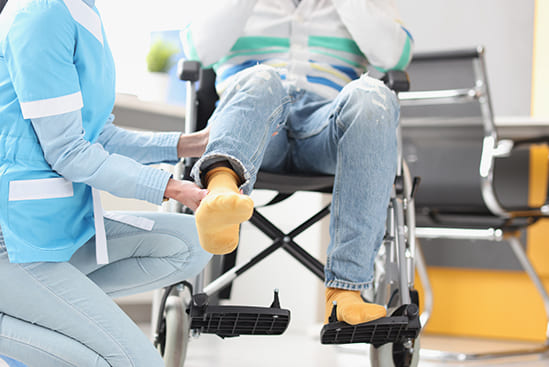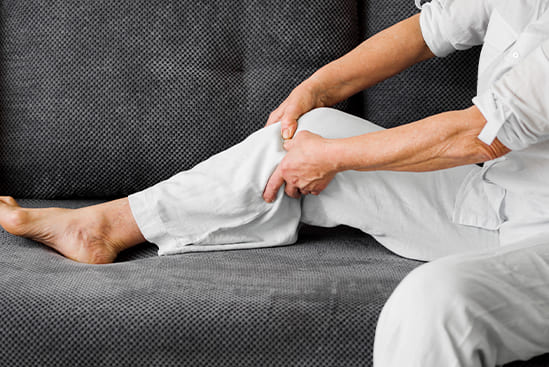
Synapse Physiotherapy
Physio Near Me for Vertigo & Dizziness | How It Works
Are you constantly searching “physio near me for vertigo and dizziness”? You’re not alone. Vertigo and dizziness affect millions of people worldwide and can significantly impact daily life. The good news is that physiotherapy can help manage and even eliminate these symptoms in many cases. This guide will walk you through how physiotherapy works for vertigo, what causes these symptoms, and how to find the right physiotherapist near you.
Understanding the Difference Between Dizziness and Vertigo
Many people use the terms dizziness and vertigo interchangeably, but they actually refer to distinct sensations. Recognizing the difference is key to understanding your symptoms and getting the right treatment.
- Dizziness is a general term used to describe feelings such as light-headedness, unsteadiness, or a sensation of fainting.
- Vertigo, on the other hand, is more specific. It refers to a false sense of movement—typically a spinning or swaying sensation—when you’re standing still.
While they may feel similar, the causes behind dizziness and vertigo can vary significantly. Dizziness can stem from blood pressure changes, dehydration, or even anxiety, whereas vertigo is usually linked to inner ear or vestibular system disorders like BPPV or vestibular neuritis.
Because the treatments differ depending on the root cause, it’s essential to accurately identify which sensation you’re experiencing. A physiotherapist trained in vestibular conditions can help distinguish between the two and guide you toward the most effective care.
What Causes Dizziness and Vertigo?
Before diving into how physiotherapy can help, it’s essential to understand that dizziness and vertigo can stem from different underlying issues. While these sensations are often grouped, their causes can vary widely—from simple dehydration to complex neurological or vestibular disorders.
Causes of Dizziness
Dizziness is a general sensation that may include feeling light-headed, unsteady, or faint. It’s often caused by non-vestibular issues, which can range from medical conditions to environmental factors. Some of the most common causes include:
- Dehydration
- Heat exhaustion
- Low blood sugar (hypoglycemia)
- Iron deficiency (anemia)
- Low blood pressure (hypotension)
- Anxiety or panic attacks
- Motion sickness
- Side effects from medications
- Alcohol use
- Head trauma
- Toxic exposure (e.g., carbon monoxide)
Although many of these causes are treated medically, dizziness related to head injuries, motion sensitivity, or persistent balance issues can often benefit from physiotherapy intervention—especially through vestibular rehabilitation or balance training.
Causes of Vertigo
Vertigo is a specific type of dizziness where you experience a false sensation of spinning or movement. This is typically due to problems with the vestibular system in your inner ear, or sometimes from conditions affecting the brain and spinal cord.
Common causes of vertigo include:
- Benign Paroxysmal Positional Vertigo (BPPV): A mechanical issue where tiny crystals in the inner ear become dislodged, leading to sudden spinning sensations.
- Meniere’s Disease: A chronic inner ear disorder involving fluid imbalance, often paired with hearing changes and tinnitus.
- Vestibular Neuritis: Inflammation of the vestibular nerve, often viral in origin, that disrupts balance.
- Labyrinthitis: An infection causing inflammation of both hearing and balance structures in the inner ear.
- Vestibular Migraine: A neurological condition where migraines affect balance and spatial orientation.
- Cerebellar Stroke or MS: More serious neurological conditions that interfere with balance regulation.
- Tumors (e.g., acoustic neuroma): Rare, but can affect the inner ear or brainstem balance pathways.
- Head injuries or concussions
- Certain medications (like aminoglycoside antibiotics or diuretics)
Common Causes of Vertigo and Dizziness That Physiotherapists Treat
While there are many causes of dizziness and vertigo, certain conditions fall squarely within the realm of physiotherapy treatment—especially when they involve the vestibular or musculoskeletal systems. Below are some of the most frequent causes that physiotherapists are trained to manage:
- BPPV (Benign Paroxysmal Positional Vertigo): This common inner ear disorder occurs when calcium crystals (otoconia) shift from their normal location, triggering short but intense episodes of vertigo. Physiotherapists use maneuvers like the Epley or Semont to reposition the crystals and eliminate symptoms.
- Vestibular Neuritis or Labyrinthitis: These infections cause inflammation in the inner ear and can result in sudden, intense vertigo with balance disturbances. Rehab exercises help the brain re-adapt and restore balance control.
- Vestibular Migraine: While managed medically for the migraine component, physiotherapy helps reduce motion sensitivity and balance problems between episodes.
- Post-Concussion Syndrome: After a head injury, lingering dizziness or balance problems can affect daily life. Physiotherapy addresses both the vestibular dysfunction and neck-related dizziness (especially after whiplash injuries).
- Cervicogenic Dizziness: This type of dizziness originates from the neck, often due to stiffness, poor posture, or injury. A physiotherapist can help with manual therapy, posture correction, and strengthening.
Benefits of physiotherapy for vertigo
Physiotherapy offers a comprehensive approach to managing vertigo by targeting both the underlying causes and the symptoms. Here’s how it can help:
- Identify the root cause and guide how to manage and reduce symptoms effectively.
- Enhance balance and coordination, making daily activities safer and more stable.
- Alleviate sensations of dizziness or spinning, helping you feel more grounded.
- Improve your ability to stand and walk confidently, reducing the risk of falls or instability.
- Help ease related symptoms like headaches, particularly in cases linked to migraines or neck tension.
- Decrease the frequency and intensity of vertigo episodes, offering long-term relief.
How Physiotherapy Helps with Vertigo and Dizziness
Vestibular physiotherapy is a specialized area focused on the inner ear and balance system. Here’s how it works:
1. Comprehensive Assessment
Your physio will start with a detailed evaluation. This includes:
- Understanding your symptoms, medical history, and triggers
- Performing balance and coordination tests
- Assessing neck movement and eye tracking
- Identifying whether your vertigo is caused by BPPV, a vestibular disorder, or something else
A correct diagnosis is crucial for effective treatment.
2. Vestibular Rehabilitation Therapy (VRT)
VRT is the main approach used by physios to treat dizziness and vertigo. It involves a series of exercises aimed at retraining your brain to interpret signals from the inner ear correctly. These exercises help improve:
- Gaze stability
- Balance and coordination
- Motion sensitivity
VRT is highly individualized. A tailored program is designed for your specific condition and symptoms.
3. Epley Maneuver and Canalith Repositioning
If you’re diagnosed with BPPV, your physio may perform specific movements like the Epley maneuver. This hands-on treatment repositions the loose crystals in your inner ear to stop the vertigo.
Most patients experience significant relief after just one or two sessions.
4. Balance Training and Gait Exercises
Physiotherapists also help with improving your ability to walk steadily and safely. This is especially important for people who’ve had falls or feel unsteady due to dizziness.
Exercises may include:
- Standing on one foot
- Walking with head turns
- Navigating obstacles
- Dual-task exercises (walking while counting, etc.)
5. Manual Therapy for Neck Issues
If your dizziness is coming from the neck (cervicogenic dizziness), your physio may use manual therapy techniques. These can include:
- Soft tissue release
- Joint mobilization
- Postural correction
- Strengthening exercises for neck stability
What to Expect During Your Visit
When you book a physiotherapy session near you for vertigo, here’s what you can typically expect:
- A 45- to 60-minute session for initial assessment
- A calm, quiet environment to avoid triggering symptoms
- Guided exercises that won’t worsen your vertigo
- Clear education on your condition and recovery timeline
You may feel slightly dizzy during or after the first few sessions, but this is temporary and part of your brain adapting to the therapy.
How Long Does It Take to Feel Better?
Recovery varies depending on the cause and how long you’ve had symptoms. However, many patients with BPPV see improvement within 1-3 sessions. Those with chronic vestibular conditions may need 4-8 weeks of therapy.
Your physiotherapist will monitor your progress and adjust your program as needed.
Tips for Finding the Best “Physio Near Me for Vertigo & Dizziness”
Searching online is a great start, but here are some tips to find the right fit:
- Look for vestibular-certified physios: Not all physiotherapists are trained in treating vertigo.
- Read reviews: Patient testimonials often highlight effective treatment and caring professionals.
- Check clinic services: Make sure vestibular rehab or BPPV treatment is listed.
- Ask about treatment plans: A good physio will customize your care rather than offering generic solutions.
Regain Your Balance with Expert Help
Dealing with vertigo or dizziness can be overwhelming, but you don’t have to manage it alone. With the right diagnosis and a personalized treatment plan, physiotherapy can significantly reduce your symptoms and help you get back to living confidently and comfortably.
If you’ve been searching for “physio near me for vertigo and dizziness”, look no further.
Synapse Physiotherapy offers specialized vestibular rehabilitation services tailored to your needs. Our experienced team is trained to assess, diagnose, and treat a wide range of balance and vestibular disorders, including BPPV, vestibular migraines, post-concussion symptoms, and cervicogenic dizziness.
Whether you’re experiencing sudden spinning sensations, balance problems, or long-term dizziness, Synapse Physiotherapy is here to support your recovery every step of the way.
Tags :

Back & Neck Pain
Conditions such as stiffness, postural abnormalities and muscle overuse from prolonged desk work at the office or home is more prevalent than most would think. We provide the necessary tools to fix you up and educate you on ergonomics which can unload unnecessary stress.
- Spine & Core Rehabilitation
- Strength & Conditioning Programme
- Pain Management
- Biomechanical Assessment
- Sports Physiotherapy
- Group Class

Sports Injuries
Rolled ankles, jarred knees, impinged shoulders are few conditions in the plethora of sports injuries which can hamper performance and limit our enjoyment of sports. Physiotherapy not only treats the symptoms of these conditions but propels your overall fitness to greater heights.
- Strength & Conditioning Programme
- Pain Management
- Biomechanical Assessment
- Sports Physiotherapy
- Shockwave Therapy
- Group Class

Work Desk Injuries
Conditions such as stiffness, postural abnormalities and muscle overuse from prolonged desk work at the office or home is more prevalent than most would think. We provide the necessary tools to fix you up and educate you on ergonomics which can unload unnecessary stress.

Pre-Post-Surgical Conditions
Surgery involves going through preparation both before and after. Physiotherapists play a vital role in getting your body ready for surgeries with circulatory, breathing and strengthening exercises. After the procedure, let us be there for your recovery and rehabilitation, taking it one step at a time.

Scoliosis & Postural Abnormalities
The way we stand, sit, walk and sleep has influence over our posture and the overall balance of muscles controlling its alignment. A comprehensive screening can be done by our physiotherapists to detect abnormalities, which we will aid in correcting.

Neurological Conditions
Neurological disabilities such as stroke, nerve compression and neuropathies can be barriers for patients to live life to its fullest. We at Synapse are committed to help you overcome these hurdles by ensuring functional mobility and quality of life is at its optimum by providing the right treatment and exercises.

Osteoarthritis & Rheumatism
Joint degeneration and inflammation happens as the human body grows older, but that does not mean our way of life degenerates as well. Relief your joint pains with a joint effort together with your physiotherapist, who will provide pain-relief treatments and prescribe exercises for your wellbeing.

Conditions Relating To Elderly
Common conditions in the older age population include hips & knee pain, back & neck pain, osteoarthritis, rheumatism, fear of falling and many more. Aging and degeneration of bodily function is inevitable, but here at Synapse, we will help you live the best of your life.

Home Physiotherapy
We understand that some conditions or injuries can make it difficult to receive rehabilitation at our clinic be it mobility or transportation issues. Our objective is to provide you with the same high-quality physiotherapy services at home that you would receive in-clinic.
